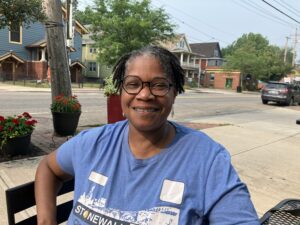 Phyllis Harris was born and raised in Cleveland, the daughter of a single mom who worked at a factory as she was growing up. She realized “at an early age that I was different”, and came out as a lesbian when she was 19 years old. She is the Executive Director of the LGBT Community Center of Greater Cleveland.
Phyllis Harris was born and raised in Cleveland, the daughter of a single mom who worked at a factory as she was growing up. She realized “at an early age that I was different”, and came out as a lesbian when she was 19 years old. She is the Executive Director of the LGBT Community Center of Greater Cleveland.
“I was born and raised here in Cleveland. My mother’s grandmother was stolen from Tennessee by an older man, sometime probably right after the Civil War, and they ended up in Richmond, Indiana. That is how our family got up north. My mom was a teen mom, she had me and my brother. Our neighborhood was all black folks; there were houses in the front, there were houses in the back.”
“My mom wanted to work. A lot of the factories were closing by the time I was born, but my mom got one of those factory jobs eventually. She taught us that you work hard; no matter what your job is, you show up and you do it in a way that has integrity.”
“My mom would say, ‘I’m doing this hard work and working in this factory, so you don’t have to’. She had a network of other young families and mothers in this working class neighborhood. The moms were all my “aunties” and all the kids became like our cousins. If we needed anything they helped us. They looked after us, you know, ‘Come on the porch when the street lights are on’ and all that stuff. My Auntie’s were very proper church going ladies, sort of a prototype for what a black woman should be. They taught us that you took care of your man. As I have grown up, I have realized I don’t have to be like that. I knew I was different from a very young age. I felt I didn’t need a man to be a real woman.”
I came out at 19, and before that I knew I was different. Some some people get upset when we say that the movement for gay rights is equivalent to the movements for racial civil rights. There’s still a lot of work to be done. I still feel tokenized in many ways and work at turning that feeling around into action around, always asking, ‘How do I leverage this opportunity to bring other people up?’ The dominant culture is still very real; they’re telling us again to leave someone behind; they’re telling us again you don’t have control over your destiny in your life.”
“If I have twenty or a hundred people of very diverse background together in a room, I would start out with some awesome food so there was something that would appeal to everyone in the room. Then we ask them to tell their stories about where they grew up and what they remember about growing up. I would try to give them a moment to find that place where they can connect, and then later we can have those more challenging conversations. That helps change something, figuring out that other human, I don’t gotta like you forever, but I don’t have to hate you.”











Leave A Comment